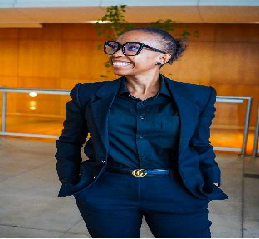4th Global
Women’s Empowerment & Leadership Summit
THEME: "Break Barriers, Build Futures"
 27-28 Oct 2025
27-28 Oct 2025  Bali, Indonesia
Bali, Indonesia THEME: "Break Barriers, Build Futures"
 27-28 Oct 2025
27-28 Oct 2025  Bali, Indonesia
Bali, Indonesia 
University of Johannesburg, South Africa
Title: Towards a Gender-Inclusive Approach for Female Representation in AI Innovation in South Africa
Lebogang Mosupye-Semenya is the Research Lead at the WOMANDLA Foundation, an organisation dedicated to empowering young women to pursue careers in STEAM (Science, Technology, Engineering, Arts, and Mathematics) through mentorship, digital literacy, and research-driven advocacy. She is also the Acting Academic Director and a Senior Lecturer in Digital Technologies at the Johannesburg Business School, University of Johannesburg. Dr Mosupye-Semenya holds a PhD in Business Management, an MBA, and a BSc in Chemical Engineering. Her research focuses on the Fourth Industrial Revolution (4IR) and emerging technologies, particularly in relation to digital transformation, innovation systems, and inclusive participation. She spent 15 years in the water sector as a chemical engineer, leading complex infrastructure projects. She is an active scholar with publications in journals, books, and conference proceedings, and serves on several academic committees. She is a member of the Scientific Committee of the Future of Education Conference (Italy), advocating for equitable, context-aware digital transformation across Africa.
This study examines the extent of women’s inclusion in Artificial Intelligence (AI) innovation in South Africa, drawing on Heeks et al.’s (2013) Ladder of Inclusive Innovation as its theoretical foundation. The framework evaluates six interrelated dimensions—intention, consumption, impact, process, structure, and post-structure—providing a holistic perspective on how women participate in, benefit from, and influence AI systems across their lifecycle.
A quantitative research design was adopted, with primary data collected through a structured online questionnaire administered to South African women, both those directly involved in AI-related professions and those indirectly affected by AI technologies. Descriptive statistical analysis was conducted to examine levels of awareness, adoption, participation in development, and perceptions of structural enablers and barriers.
The findings indicate that while there is widespread interest in AI among women, meaningful inclusion remains constrained by several factors. These include limited access to targeted training and mentorship opportunities, insufficient institutional frameworks to support career progression in AI fields, and a perceived lack of intentionality in designing AI systems that address women’s specific socio-economic and safety-related needs. Respondents further highlighted concerns about algorithmic bias and the underrepresentation of women in AI leadership and policy spaces.
To advance women’s participation in AI innovation, the study calls for coordinated interventions across education, industry, and government. These include embedding AI and digital skills development into educational curricula, establishing mentorship and sponsorship initiatives, promoting inclusive organisational practices, and formulating policy mechanisms that prioritise equity in technology innovation. Such measures are essential not only to broaden participation but to ensure that AI systems reflect diverse lived experiences and contribute meaningfully to inclusive socio-technical development in South Africa.
The study contributes empirical evidence to national and global discourses on inclusive digital transformation and offers a foundation for future research and policy reform.